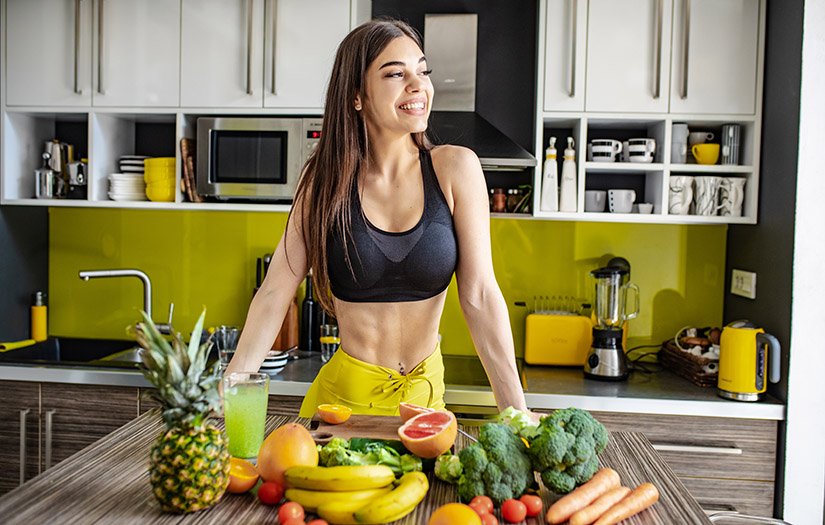An athlete can eat a vegan or vegetarian diet without sacrificing their performance or body composition, but it takes planning and intentional food choices to be successful.
This article will help to serve as a nutrition guide for plant-based athletes as they navigate meal planning for performance.
To give professional nutritional advice specific to sports nutrition, become a sports nutrition coach today!
Nutritional Needs for Vegan Athletes
A vegan diet is a plant-based diet that excludes the consumption of all animal products, including meat, fish, eggs, and dairy. The exclusion of these foods requires the vegan athlete to find alternative sources for the nutrients that they provide, like plant-based protein sources and important micronutrients like vitamin B12 and calcium.
Micronutrient needs
Micronutrients are vitamins and minerals needed by the body in very small amounts. These vital nutrients can generally be obtained by eating a wide array of foods. However, in a meal plan that excludes certain foods, as a vegan diet, it’s necessary to find alternative sources to meet the body’s needs for micronutrients.
Vitamin B12
Vitamin B12 assists in red blood cell formation, cell metabolism, nerve function, and the production of DNA (Mayo Clinic, 2017).
Best vegan source: Take a B12 supplement
Omega 3 Fatty Acids
Omega-3 fats are important for heart health, lower blood pressure and heart rate, improved blood vessel function, and lower inflammation (Harvard School of Public Health, 2021).
Best vegan source: EPA/DHA supplements derive these fatty acids from microalgae and are available over the counter.
Calcium
According to the National Osteoporosis Foundation (2018), calcium is important for more than just strong, healthy bones. It also enables our blood to clot, our muscles to contract, and our heart to beat.
Best vegan source: Leafy green vegetables.
Iron
Iron helps to transport oxygen to tissues throughout the body for metabolism.
Best vegan source: Dark leafy greens, legumes, and dried fruits. It’s important to consider that these sources of iron are not absorbed by the body as readily as meat sources. To increase absorption, include vitamin C-rich foods in your diet, like red and green bell peppers, kale, brussels sprouts, cabbage, oranges, or pineapples, to name a few (Lynch & Cook, 1980).
Macronutrient needs
Protein, fat, and carbohydrates are macronutrients or the nutrients that your body uses in the largest amounts. These nutrients are sourced in the foods that we eat and must be eaten in proper proportions to support our health and athletic goals.
Protein
Protein is not only important for muscle repair and building, it also provides a structure for other tissues in the body such as cell membranes, organs, hair, skin, nails, bones, tendons, ligaments, and blood plasma.
For athletes or individuals looking to maximize muscle growth and training adaptations, protein targets of 0.7 to 1.0 grams/pound are appropriate. Vegan sources of protein include lentils, beans, soy products, nuts, seeds, and whole grains.
Read also: Protein Sources for Vegans and Vegetarians
Fat
We need fat as an energy reserve, to insulate and protect organs, and also to absorb fat-soluble vitamins. 20-35% of your daily calories should come from healthy fats like vegetable oils (olive, canola, and avocado oil), avocado, flax seeds, chia seeds, olives, nuts, and seeds. Due to a higher carbohydrate requirement for athletes, fat intake will generally be on the lower end of the spectrum.
Carbohydrates
Carbohydrates serve as the main energy resource for all humans and are critically important for athletes. Athletes can consume anywhere between 40-65% of their calories from carbohydrates, depending on how intense and how long their training is.
The more intense and frequent your training is, the more carbohydrates you will need to consume.
Vegan food sources to specifically build muscle
In order to build muscle, vegan athletes will need to ensure that they are eating sufficient calories throughout the day, and meeting their protein needs. It may be necessary to eat several meals (3-5) throughout the day in order to accomplish this. Here are some examples of plant-based protein sources:
Tofu: 20g per 1 cup
Tempeh: 15g per ½ cup
Beans/Lentils: 7-8g per ½ cup serving
Hemp seeds: 9.5g per 1 ounce
Pumpkin seeds 8.5g per 1 ounce
Nut butter: 8g per 2 TBSP
Grains: 3-5 grams per ½ cup cooked
Athletes may also consider adding a serving of vegan protein powder once a day to supplement their protein intake for muscle building.
Nutritional Needs for Vegetarian Athletes
A vegetarian athlete abstains from eating meat, fish, and poultry. There are several forms of vegetarianism, including:
Lacto-ovo-vegetarian: Eliminates meat, fish, and poultry but eats eggs and dairy products.
Lacto-vegetarian: Eliminates meat, fish, poultry, and eggs, but allows dairy products.
Ovo-vegetarian: Eliminates meat, fish, poultry, and dairy products, but allows eggs.
Pescatarian: Eliminates meat and poultry but allows fish and sometimes egg and dairy products.
Micronutrient needs
Just as with vegan diets, vegetarian diets can be deficient in vitamin B12, DHA/EPA, calcium, and iron. Vitamin B12 and DHA/EPA will need to be supplemented, but vegetarians can get sufficient calcium from dairy products or leafy greens. Pescatarians will be able to get their EPA/DHA from fatty fish like salmon, mackerel, sea bass, or sardines.
Vegetarians need the same amounts of macronutrients that vegan athletes do, but they have broader options for proteins when they consume eggs, dairy, or fish (which are good sources of protein).
Check out this micronutrient guide for a great overview of these micros.
Sample Meal Plan for Plant-Based Athletes
Take the plate-construction approach to simplify meal planning.
Start with your protein. Fill one-third of your plate with a plant-based protein
For vegans: black beans, kidney beans, tofu, or lentils
For vegetarians: eggs, Greek yogurt, cottage cheese, or fish might also be an option
Next, add carbohydrates. Roughly one-quarter to one-third of your plate will have a plant-based carbohydrate (like whole grains, starchy vegetables, and/or fruit). If your protein source is higher in carbs (like beans and lentils), you can include less carb sources in this section of your plate.
Next, non-starchy vegetables. Fill the remaining space on your plate with non-starchy vegetables like leafy greens, bell pepper, zucchini, broccoli, cauliflower, etc.
Finally, add a serving of a healthy fat. (1/4 avocado, 1 tsp oil, small handful of nuts or seeds).
You can eat your meal on a plate as described, or you can try combining ingredients into a bowl, making soups, smoothies (probably not with beans, IMO), or salads for variety. These different meal options will also allow you to eat a variety of both cooked and raw sources of plant-based foods!
Why Aren’t All Athletes Vegans & Is it More Effective to Have a Plant-Based Diet?
An athlete chooses his or her nutrition based on their food preferences, convenience, and sustainability. For some, it doesn’t seem sustainable to cut out animal-based food products. For others, they prefer the taste and ease of eating animal-based food products over their vegan or vegetarian alternatives.
Plant-based diets are great for weight loss, and offer a wide range of health and lifestyle benefits, but they might not support your unique needs as an athlete.
Pros and Potential Cons for Going Plant-Based as an Athlete
Pros:
A vegan or vegetarian diet can offer many health benefits when it includes plant sources of food and minimal processed foods. Diets that include higher amounts of fruits and vegetables are indisputably healthier than diets that include large amounts of processed meat and processed foods. Vegan and vegetarian diets also tend to be higher in carbohydrates, which is beneficial for performance.
Cons:
Athletes who are vegan or vegetarian will have to pay more attention to getting adequate protein and eating sufficient calories in order to optimize performance and health. It’s easier as a vegan or vegetarian to be deficient in important micronutrients, protein, and calories, which can all impact health and performance. It might be harder to stick to a plant-based diet when traveling frequently for competition due to limited food options on the road.
For a non-vegan or vegetarian take on dieting for athletes, see: Paleo Dieting for Athletes.
References:
Harvard School of Public Health. Omega-3 fatty acids: An essential contribution (2021). Retrieved from https://www.hsph.harvard.edu/nutritionsource/what-should-you-eat/fats-and-cholesterol/types-of-fat/omega-3-fats/
Lynch, S.R. and Cook, J.D. Interaction of vitamin C and iron. Ann N Y Acad Sci. 1980;355:32-44. doi: 10.1111/j.1749-6632.1980.tb21325.x
Mayo Clinic. Vitamin B-12 (2021, July 17). Retrieved from https://www.mayoclinic.org/drugs-supplements-vitamin-b12/art-20363663#:~:text=Vitamin%20B%2D12%20(cobalamin),meat%2C%20fish%20and%20dairy%20products
National Osteoporosis Foundation. Calcium and vitamin D. (2018, February 26). Retrieved from
https://www.nof.org/patients/treatment/calciumvitamin-d/#:~:text=Calcium%20is%20a%20mineral%20that,in%20our%20bones%20and%20teeth.

















